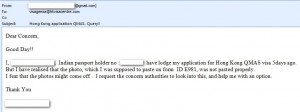
Why I Hate the Hong Kong Quality Migrant Admission Scheme (& You Should Too)
Posted in Musing, Special Programmes, The Hong Kong Visa Geeza /
The Quality Migrant Admission Scheme sucks.
It really does.
Granted, for those fortunate souls who go on to finagle a QMAS result out of the Director of Immigration, the programme is a complete godsend.
And all power to them.
If it gets them a visa to make a contribution to our fine city, that’s all well and good by me.
More happy customers.
I am, after all, in the business of getting people visas to live, work and start businesses in Hong Kong – which is exactly what the Quality Migrant Admission Scheme was set up to do.
Every six months or so, I am the first to shout “Hallelujah” from the top of Immigration Tower as the balls pop out of the lotto machine (oops, I mean when the Selection Exercise results are announced) conferring this hallowed visa status on the lucky few making the cut.
But for me, QMAS is just a nightmare.
Why?
What The Hell Are They Looking For?
The QMAS programme is different from the General Employment Policy in so much as the HKID have put out a set of Guidelines on how to go about preparing, submitting and managing this particular type of visa application.
Whilst this in of itself is a positive step forward, there really is no indication as to what the HKID are actually looking for from applicants other than the barely defined ‘quality talent’.
The closest the Department come to letting on who actually might get approved for a QMAS visa is to intimate that if you have won a Nobel prize, represented your country in the Olympics or are a world famous musician, you’ll likely receive the maximum number of points, win a ‘home run’ and therefore be ‘positively considered’.
Hardly applicable to the run-of-the-mill applicant.
So what are we supposed to glean from this?
The problem is that satisfying the basic “Must Meet” criteria hardly presents a major obstacle if you are a reasonably well educated professional with a few years of employment experience under your belt.
Assuming you get the minimum number of points (80 out of 165 – and most applicants do), the application process is set up to then let you state your case through the submission of documents and no more than one page of supporting representations.
Consequently, the generalities of the Guidelines and the format the application process takes all but reduces the application experience to filling in the forms and hoping that you’re going to pass muster.
In designing the QMAS this way, the HKID have misunderstood the psychology of participants considering the programme.
Making a commitment to a new life in Hong Kong involves a requirement of at least some certainty of visa approval.
Of course, it doesn’t matter how onerous the requirements for approval are, so long as you know that if you tick all the boxes your probability of being successful can reasonably be ascertained, this is often enough to decide to make the emotional investment in an application.
Starting a new life in a different country is a decision not taken lightly.
Under the QMAS programme, though, you get to know which boxes to tick to get into the game but after that, you’re in a black box.
The system sets people up for uncertainty, disappointment and frustration.
No Idea Who You’re Competing Against
Once you have gotten past first base and you’re in the selection pool, you have absolutely no idea who you’re competing against. Period.
Imagine that!
If the HKID told you that, so long as you are able to finish in the first 100 of the Kowloon Marathon, they would grant you a visa to take up residence in Hong Kong without conditions – you’d think that was a pretty attractive offer wouldn’t you?
Essentially you’d have to get into reasonable shape, train for a few months and then go for it.
But of course, before you embarked on such an exercise, wouldn’t you want to know who you were competing against?
It’s only rational to want to know the odds of success before you get stuck in to such a challenge.
If the Immigration Department don’t tell you who you’re up against you have no way to assess the chances of getting a result worthy of the investment of endeavour in the first place, right?
Well, under QMAS, this is what you face.
Whilst you don’t have to run a marathon for a QMAS visa (far from it in fact), you still have no chance of knowing who you’re competing against because of the way the system has been designed.
So it effectively reduces the programme to a lottery.
Most self-respecting ‘talents’ have a lot to give up in their home country to come to Hong Kong so why would you run the crap shoot of the QMAS programme when there’s almost zero visibility on the chances of a positive outcome?
Impossible to Learn What Works and What Doesn’t
I have a client. A real pro.
Before he came to us, he had followed in the footsteps of his colleague, a similar pro, who had successfully secured a QMAS approval 12 months prior.
Our client, quite reasonably, assumed that if his colleague with exactly the same professional profile as him had passed muster under QMAS, then he would too.
So he made an application.
Seven months later, he was refused. Go figure?
He did. And learned nothing.
He came to us wondering about his options now (as it happens we got him another type of visa so his life plan for Hong Kong is being played out).
But how the hell were we supposed to advise him about a re-application for QMAS in those circumstances?
Were we supposed to tweak the submission he had made, wait for another 6-7 months and then hope it all would come good in the end?
This guy is very smart. He didn’t put a foot wrong in his application. We had nothing to offer him on the QMAS side.
The most insightful response he got from the HKID was perhaps if he tried again citing another industry sector his application would be put before a different set of assessors on the Selection Committee.
Possibly a different outcome? Another half year of waiting and hoping?
Surely, quality talents deserve better than this.
The Lack of a Proper Application Fee Encourages All-Comers
With the advent of QMAS and the manifest lack of an application fee, the programme attracts all-comers.
Nothing wrong with that if you attract the right sort of applicant.
But, from the email I receive, I can assure you, there’s a lot of ‘anti-talents’ out there.
Just look at this email I received out of the blue just yesterday.
Click Image to Enlarge
This is not to chide the poor soul for not gluing his photo on the application form firmly enough.
It’s a fair mistake.
However, the way he emailed me intimating his problem is something that I should be associated with really does beg the question if he is actually smart enough for the programme?
And there lies the rub.
It’s quite typical of the unsolicited email I receive in respect of QMAS.
To participate in a similar residence-for-talent immigration programme in Canada, Australia, New Zealand, the US or the UK invariably costs a decent wedge in official application fees.
However, in Hong Kong the only formal expense involved is the cost of the visa label issued AFTER approval (currently HKD160 per passport).
In Australia you wont get much change back from a HKD50,000 note by the time the authorities are ready to put your visa label in your passport (win or lose).
So it means that literally thousands of applicants line themselves up for the QMAS programme, extending the case consideration times and muddying the competitive waters when a large number of them are intrinsically never likely to ever get approved.
They have nothing to lose and not one iota of skin in the game.
The irony is that, to go on to get an approval you need to show that you have the funds to support yourself for the first 12 months after your new QMAS visa is issued.
Why not, then, make it complusory to accompany a QMAS application with a refundable deposit of, say, HKD100,000, returned to an applicant when their application result is notified (win or lose)?
At a stroke, this would improve the quality pool and perhaps lead to a better application experience.
But it wouldn’t remedy the other problems I have outlined.
Quick Make Another Selection
With other visa types, case experience allows an immigration consultant to offer up an expectation of approvability with at least a measure of certainty to the client to enable his planning.
Most other visa types take a lot less longer to process and, 9 times out of 10, by the time we have gone through the list of immigration options open to an aspiring resident of the HKSAR, the QMAS is invariably not up for detailed consideration.
It’s just too uncertain and takes too damn long.



